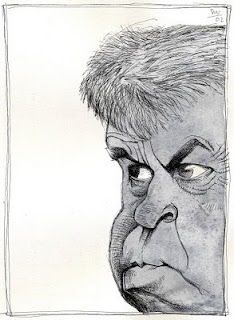Guus Hiddink's reign as manager of Turkey has ended with nary a whimper. His tenure faded ignominiously into the Black and Aegean Seas: Turkey received 3-0 losses in both legs of the Euro 2012 qualification playoffs from a journeyman Croatia side. He's now a free agent and joins Carlo Ancelotti as the biggest - and most marketable - free agent in his profession.
It would surprise no-one were he to return to Chelsea in a Director's role, creating with Andre Villas-Boas a management "Dream Team". Rumours of him taking over as manager, however, are greatly overstated.
It was always likely Hiddink would depart the Bosphorus nation should Turkey fail to qualify. This is in part due to his meandering nature and wandering eye; also because it became apparent nearly from the start that this partnership wasn't nearly as affectionate as past flings with Russia, Chelsea, PSV, Australia and South Korea. Fittingly, in his last home match, he was booed by Turkish crowds.
For the first time in the decade since he ascended from "coach" to "miracle worker", he's criticised his former employers on departure, saying Turkish youth development pathways weren't of sufficient standard for consistent performance at international level.
It marked the second time that Hiddink leaves Turkey without adding to his reputation: in 1991 he was dismissed from Fenerbahçe with a win rate of only 40%. In seventeen games with the Ay Yıldızlılar, he compiled an patchy seven wins, five draws and five losses (41.18%). Both numbers stand well below his career win percentage of 56.52.
Questions are now being asked if the Dutchman's magic has worn thin. His last two jobs have finished unsatisfactorily with Russia and Turkey enduring qualification playoff defeats. Even understanding the "Fool me once, fool me twice" mindset, this analysis is premature and, at worst, a little mean-spirited. As in most break-ups, both parties eventually realised they were just wrong for each other in the first place.
Looking at his greatest achievements (with the exception of his first stint at PSV), Hiddink and his teams have performed best when unfancied and under little pressure. It should be the first rule of football - never bet against a Guus Hiddink team.
Over the last decade, he coaxed a Euro 2008 semi-final berth out of Russia when outsiders didn't know what to expect. When expectations rose after players like Arshavin and Pavlyuchenko got moves to high-profile clubs, the squad underperformed and went down to Slovenia in a winner-takes-all bout over two legs for a place at the 2010 World Cup.
At Chelsea, he was recruited to salvage the season after Luis Felipe Scolari's dismissal. With minimal pressure - it was a temporary appointment and everyone was aware the title had long gone - he once again attained maximal results.
His quotes on masterminding a gritty, but not overly talented Australia to the second round of the 2006 Cup could define his coaching career: "Our goal is the second round. Why not?" Fourth place in 2002 with then-tiny South Korea was nigh-on miraculous. By fostering belief in his players, Guus Hiddink has spent the past decade getting the best out of underdogs with reasonable expectations.
After a stupendous Euro 2008, both Turkey and Russia had reason to be ambitious in expectation. However, this was followed by failure to qualify for South Africa despite quality players and enviable home-field advantages. It should have worked - but didn't. No-one manages expectation like Hiddink - so when it becomes rampant, his work becomes more difficult and less masterly in its execution.
We'll see Guus Hiddink again soon. Rumours persist of a 22 million pound offer to manage Anzhi Makhachkala. If he cares to protect his Lama-like coaching reputation, he won't take that job. It's too glitzy, too dangerous and just not his type.


No comments:
Post a Comment